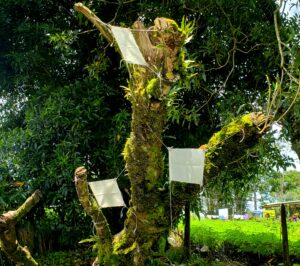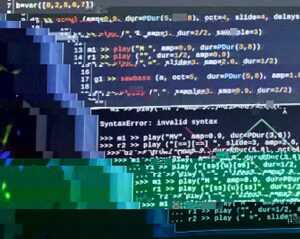If I have a code-line and you have a code line, and we share it, we both have 2 code lines …
Intro
Code as Commons proposes an activation and reactivation of the idea of the commons through code-based experiences and a common involvement-participation in AC School / documenta fifteen.
Through 2 lines we want to reflect about how our common code can be spread in several ways as a tentacle.
Artistic research
Based on Curating common well-being, a research on cultural commons, its meaning and implementation, its topics will be activated by production of content in radio format and new conversations with Arts Collaboratory network and documenta fifteen participants.
Power to the Commons Assembly
Power To The Commons! is an ongoing collaborative project developed through a collaboration of arts initiatives in Latin America and Africa within Arts Collaboratory. The project is an explorative one, seeking ways of practicing the commons within artistic forms, but also understanding the specificities of the commons rooted in our various contexts. The project brings together arts initiatives and commons researchers in collaboration.
On the occasion of documenta15, and the AC School, Power To The Commons gathers together a series of projects and peoples all concerned with imagining, creating and theorizing the commons from the global south. The Power to the Commons Assembly is framed with Platohedro’s CODE AS COMMONS at its centre, and joined by the team behind Common Life, as well as other projects and interests within the broader documenta15 programme as well as the ecosystem of Kassel. It serves as an opportunity to:
- Share experiences and learnings from various projects and research processes
- Develop explorations of Buen Vivir/Sumak Kawsay and ubuntu as foundations for global south imaginations of the commons
- Develop radio and other tools to share knowledges emerging out of different projects
- Develop creative responses to and a lexicon for commons in local contexts in the global south
- Connect with a broader ecosystem of initiatives, projects and organizations from the global south
- Lexicon and languages of commons from our contexts
Participants
Power to the commons! AC
- Platohedro
- Penny Travlou
- Kër Thiossane
- Dieynaba Ndiaye
- Waza
- Bren Heymans
- Molemo Moiloa
Common Life
- Kino Kadre
- Taryn Mckay
- Afrika Arts Kollective
- David Kaiza
- Dzimbanhete
- Tafadzwa Gwetai
- Festival Sur Le Niger
- Ibrahima Wane
07-09/07/2022 | 14:30-17:30
Commons Library Space at Fridskul
Artistic Interventions
Based on interventions and performances that try to develop a free idea of knowledge (Good Knowledge) and how to relate and communicate with other living and non-living beings in a global context permeated by the crisis.
Intercommons Power Object

Pandemic time, the construction of the first devices to listen, reflect and observe other species. 2020, 2021 have been two years of exploration from antennas, portals and interdimensional accelerators, devices installed in a nearby forest, the prominence of rocks, plants, lichen, fungi and micro-organisms. Devices or artefacts useless for extractive capitalism, for colonialism or for white power. Devices to experiment with different ways of interconnecting ourselves. Life in the Plantocene, as Natasha Myers says, and the play of this with other beings such as rocks, fungi and micro-organisms, putting observation into relationships and collaborations to formulate other inventive forms of speculative fabulation, to dream of other worlds….
Multi-specie installation
TrafoHaus Park
Parliament of things – non human dialogues

Plants, rocks, wood, water, grains or others are the elements of this parliament, a non-human conversation and relationship that explores the principles of Good Living: knowing how to meditate, knowing how to dance, knowing how to dream, knowing how to drink, knowing how to give and receive… As tools provided for humans to achieve connection through “the common code” with non-humans.
14/07/2022 | 18:00-19:00
TrafoHaus Park
Low cost code system – Livecoding performance

Livecoding was born and has developed in a hacker environment, where the philosophy of open source, transparency and the emphasis on generating community are structural
The hacker culture (jaquer*) digital – multimedia, opens alternative spaces that allow infinite creative and artistic possibilities through co-creation, collaboration and exchange of knowledge.
09/07/2022 | 20:00-21:00
TrafoHaus Park
“Code as Commons Inspiration”
Free software is one of the ways to flux knowledge, to expand it and allow it to have a transformative and multiplicative effect.
Open source refers to open access, to reproduction and dissemination of the source code: information, knowledge, design, a pedagogical program, etc…any product, service or activity.
Open source facilitates its copy, reuse, remix, re-contextualization in several inter-connected communities, it allows the viral action, and the production of adaptations from the original that can be improved.
The open source exemplifies and becomes operative by the desire of access and collaboration around a common project.
And last but not least, the philosophy of Free Software may abandone centralized models, in order to imagine big , diverse ecosystems, an internet that goes farther its virtual conception and that can generate emerging systems, temporal structures, federation with others, that can change, be amplified, be mutant, be hybrid….
We considered that it contributes directly to the search of Good Living.
Good Living is a concept based on Andean indigenous wisdom (Sumak Kawsay in Quechua and Suma Qamaña in the Aymara language) and practice of more balanced relationships within ecosystems and amongst all beings, human and non-human, as a path to a common well-being. For Platohedro, this is the vision that guides our practices and our missionary starting point. Everything we do relates and adapts to this way of thinking, doing and being. And as such, we consider it a dynamic concept, which we translate and make our own with respect and care by situating it in time, context, needs and desires.
The Good living principles are:
- Suma Manqaña | #SaberComer |Conscious Eating
- Suma Umaña | #SaberBeber |Conscious Drinking
- Suma Thokoña | #SaberDanzar|Conscious Dancing
- Suma Ikiña | #SaberDormir |Conscious Sleeping
- Suma Irnakaña | #SaberTrabajar |Conscious Working
- Suma Lupiña | #SaberMeditar |Conscious Meditation
- Suma Amuyaña | #SaberPensar |Conscious Thinking
- Suma Munaña, Munayasiña |#SaberAmarYserAmadx | ConsciousLoving and Being Loved
- Suma Ist aña |#SaberEscuchar|Conscious Listening
- Suma Aruskipaña |#SaberHablarBien | Conscious Speech
- Suma Samkasiña | #SaberSoñar |Conscious Dreaming
12. Suma Sarnaqaña |#SaberCaminar|Conscious Walking - Suma Churaña, Suma Katukaña |#SaberDarYRecibir | ConsciousReciprocity
This process is part of the Power to the Commons! AC collaborative project developed in 2020 together with Kër Thiossane, Waza, together with the researchers Penny Travlou (Edinburgh) Dieynaba Ndiaye (Senegal), Iris Bouillet (Switzerland) and Molemo Moiloa (South Africa). Power to the Commons! Seeks to promote and elevate creative critical thinking and collaboration between organizations from the global South in the meaning of the commons in and for our local contexts.
